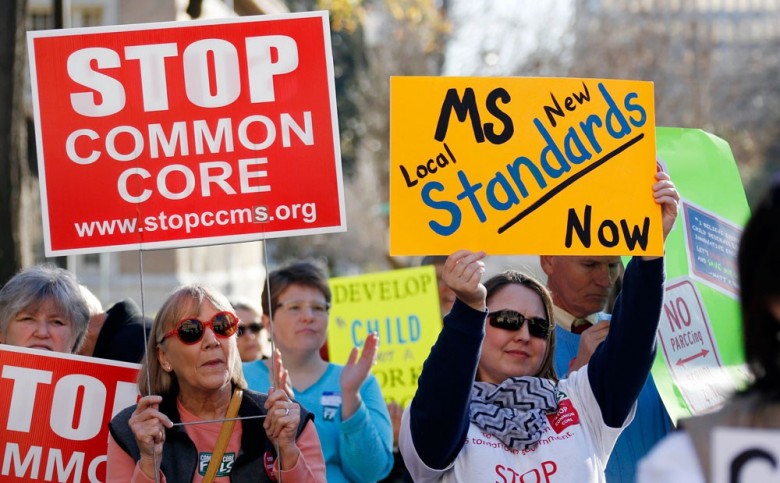The BLOG: Campaign 2016
Did duplicity about Common Core’s standards help lead to national incivility and voter alienation?
Sandra Stotsky | November 4, 2016

Common Core opponents wave signs and cheer at a rally opposing Mississippi’s continued use of the academic standards in Jackson, Miss. (AP Photo/Rogelio V. Solis,File)
The current degradation of the presidential campaign (it seems to be about who can better smear the other major candidate) and the purported alienation of many voters may have begun in 2009/2010 with the duplicitous campaign to trick the public into buying an empty set of K-12 skills described as “rigorous” standards, supposedly aimed at developing “deeper understanding” and “critical thinking skills.” By now it is clear that this multi-tentacled project was intended to centralize education policy making in this country and to close “gaps” by letting distant bureaucrats base pass scores on unvetted test items. It is also clear that most of this duplicitous campaign was financed by (1) a multi-billionaire intent on changing his public image from a vulture capitalist to a benevolent philanthropist—and (2) the lure of tax money doled out by his friends in the U.S. Department of Education to willing bureaucrats in state agencies and on state boards across the country. They and their high-tech friends are the only ones who have demonstrably gained anything from this project—certainly not the low-achieving kids that most education organizations claim to want to protect.
Many voters won’t accept the possibility that there could even be a connection between the Common Core project (with “rebranded” standards in almost all states that bought the original package) and the current presidential campaign. But those who have watched the corruption of our public education system metastacize through the publishing world, our academic institutions and related agencies, our state judiciaries and justice systems, and our media can think of no stronger influence on our public institutions than a project that was “rotten to the core,” led by education charlatans (not one had ever come up with or implemented a demonstrably effective policy in education), and protested from the start by people with skin in the game—their own children in Common Cored schools.
Let me count some of the ways in which this project has bloated local school budgets: large increases in non-teaching personnel on the school payroll (e.g., “data managers”), millions of dollars spent on new testing infra-structures and digital appliances in the classroom, and endless millions on something mischievously labeled “professional development” for teachers and administrators, with no gains in student achievement by grade 12 or “gaps” closed on national tests to justify these mysterious school budgets. In fact, while the percentage of U.S. students with meaningless high school diplomas increases, their scores in mathematics and reading on national tests still independent of manipulation by the U.S. Department of Education (tests not yet “postponed for budgetary reasons”) have decreased.
First, we need to be skeptical about interpreting current increases in the percentage of high school diplomas awarded as a sign of progress. Second, we should require Common Cored schools for the children of education policy makers and benevolent philanthropists—and give choices to other parents. Above all, we need to rekindle local voters’ engagement in examining and shaping the budgets of the schools they directly pay for, beginning with polite questions like “How many non-teaching personnel have been added to the school payroll in the past 5 years?”






